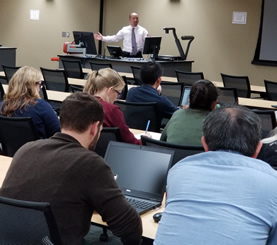Education
CONDUCTING RESEARCH REQUIRES KNOWLEDGE AND UNDERSTANDING OF THE PROCESS AND THE FEDERAL REGULATIONS INVOLVED. THE CRI OFFERS A VARIETY OF EDUCATIONAL PROGRAMS AT MULTIPLE EXPERIENCE LEVELS. SOME ARE FORMALLY APPROVED COURSES AND ELECTIVES; OTHERS AWARD CERTIFICATES, HOWEVER, MOST INCLUDE PRACTICAL APPLICATION OF LEARNED SKILLS.
Educational Videos and Presentations
Free Textbook of Clinical Vignettes
Catalog Courses
School of Medicine (4th-year elective)
MDS806H (Lubbock) Clinical Research
At the beginning of the elective, each student will be assigned to a nurse coordinator
and will be increasingly involved in working with that coordinator on the studies
they are running. An opportunity will be given for the students to choose between
various ongoing studies, but this must be done early since they must have passed the
CITI training program and have IRB approval to participate in individual studies.
Each student should be involved both with studies involving human subjects and those
involving chart reviews. It would be anticipated that the students would receive authorship
on any publication resulting from studies on which they are involved, provided that
their participation is meaningful. Early in the elective, there will be an emphasis
on didactic material beginning with discussions about the regulations and ethical
considerations related to research in humans, the background for these and the role
played by the IRB and an Office of Research Integrity. This will be followed by sessions
on how to develop the proposal for a research project from conception of the idea
through formulation of a hypothesis and specific aims, compiling the background, constructing
the appropriate methods and analysis of results and, finally, a discussion of the
potential significance. It will be expected that each student will develop a proposal/protocol
during the elective with an ongoing active critique process.
Graduate School of Biomedical Sciences
GSBS5303 Introduction to Clinical Research (3:2:3)
Students will be involved in all aspects of preparation for and execution of prospective
human studies and retrospective chart reviews. The didactic training deals with the
regulations and ethical considerations related to research in humans, the process
of obtaining approval for a study and the requirements associated with conducting
a study.
School of Health Professions
Research Design and Statistics (9 SCH)
HPPH 7321 Research Design & Statistics
HPPH 7322 Intermediate Statistical Methods
HPPH 7323 Selected Topics in Statistics
HPPH 7321 Research Design & Statistics
HPPH 7322 Intermediate Statistical Methods
HPPH 7323 Selected Topics in Statistics
Non-Catalog Courses
Continuing Education Credit or Certificate Awarded upon completion
Faculty Affairs and Development
Translational and Clinical Research; Purpose of the Course: Enable faculty to develop
successful, fundable projects at TTUHSC SOM. NIH has shifted its focus on individualized
research to a more collaborative approach targeting; bench to bedside; research or
translational research where findings in the lab can be moved to clinics. As such,
a certain amount of retooling in is in order for the traditional basic and clinical
scientist. The TTUHSC SOM will present a course targeted at helping all faculty who
are interested in either initiating or reviving their research activity. The course
will focus on identifying a research question, developing a testable hypothesis and
then preparing an individual research proposal (the product of the course).
Clinical Research Coordinator Training
Individuals will have a general overview and history of clinical research. Topics covered during the course are as follows: Basic Definitions, Phases Study Design; Regulatory bodies, Regulations; ICH-GCP; Study team responsibilities; Contract Budget Negotiation; Clinical Research Accounting; Study Conduct from SQV to Closure; and Common Mistakes; Audits.



